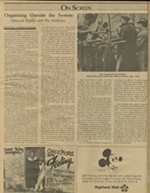John Carpenter's Vampires
Reviewed by Louis Black, Fri., March 3, 2000

John Carpenter's Vampires
D: John Carpenter (1998); with James Woods, Daniel Baldwin, Sheryl Lee, Thomas Ian Griffith, Maximilian Schell, Tim Guinee.Few careers are as curious as John Carpenter's, and I'm convinced that over the next decades, his reputation will only increase. Here is one director whose body of work is much more than the sum of its parts. Not that a lot of his films aren't great, they just all resonate within the context of each other. Carpenter's films bubble over with ideas, though on occasion the execution drags behind. There is no way for me to think about Carpenter outside his history as a filmmaker. Watching his work on video in a lump may be one thing, but living with the growth of his career -- with first discovering him and then eagerly awaiting each new work -- is something else. Dark Star (1974), Carpenter's first film, written by Dan O'Bannon (Alien, Total Recall) was a cult hit. A satiric look at some space travelers whose job is to blow up planets, it begins to run thin before it runs out. Still, the film is very funny, the travelers trapped in their ship for way too long, beginning to get on each other's nerves. I saw the film a few times, though I never took note of the creators. Sometime in late 1977 or early '78, a friend invited me over to watch Assault on Precinct 13 (1976) on cable, knowing how much I loved exploitation films. I liked the film, but it wasn't until the second time I saw the film that I swooned, falling in love with it. The perfect remake/rethinking of Howard Hawks' Rio Bravo trilogy (three films with essentially the same story), Assault is one of my all-time favorites. Asian, Hispanic, African-American, and white street gangs assault a precinct house in L.A. that is to be abandoned the next day. There's only a handful of officers and prisoners there. A siege occurs. Bless cable television, because I got to see Assault several times before the release of Halloween late in '78. The word on the film was great, and we were excited. There is no way now, 20 years later, that viewing Halloween for the first time can have the impact it had then. Every shot has been imitated, every idea recast into not one but a series of movies. At the time, it was explosive, the medium was the monster as Carpenter exploited the hell out of the recently developed Stedicam camera. Suddenly it just wasn't opening doors and descending into cellars that was scary -- with every step you walked, every breath you took, the horror might be there. What an adrenaline rush. On top of this was the haunting score. (Carpenter has done the music for 15 of his 18 movies.)
The next film was the first misstep. The Fog (1980) has more good ideas than a studio release schedule has bad movies, yet it doesn't quite gel. I find now that during this whole period I was disappointed in most of his films the first time I saw them -- but looking back now, it seems a stunning filmography: Escape From New York (1981), The Thing (1982), and Christine (1983). After Starman (1984) was Big Trouble in Little China (1986), which I thought was a real mess when I first saw it and now, dozens of viewings later, regard it only with affection. But Starman, Prince of Darkness (1987), and They Live (1988), though boasting great moments, all failed to come together successfully. The work since then has also been uneven. But my point here is that I've often been wrong on Carpenter before, my first viewing giving a misleading impression (and I probably should watch The Fog again). Watching Carpenter's films over and over, I realize the problem is often mine; I'm expecting too much and too little from Carpenter. I wasn't watching the movies he had made but the ones I thought he should have made. On subsequent screenings I've come to love so many of the films I was mixed on at first.
John Carpenter's Vampires has everything going for it -- taut direction, a terrific script, a great cast, and yet, somehow, it doesn't seem to come together. My classic Carpenter complaint. Vampire slayer Jack Crow (Woods) heads up a team of mercenaries, paid for by the Vatican, who go around the country destroying vampire nests. The film opens with them wiping out such a nest, but the master is missing. Later, when the sun is down, the team is ambushed by Valek (Griffith). He is not only the missing master but also the mother-sucker who started the whole vampire craze 600 years ago. When a Vatican exorcism went bad, Valek went for blood, and the rest, as they say, is mythology. It turns out Valek is searching for the hidden Berziers Cross to finish off that long-ago ritual, giving him the power to live in the sunlight. Aided by the only other survivor from his team (Baldwin), along with a prostitute who is bitten but not-yet-turned (Lee) and a priest (Guinee), Crow goes after Valek. The effects are terrific. Scenes of slayers tracking vampires down in dark houses, shooting them with arrows with wires attached, and then methodically dragging them into the sunlight are great. This is more a traditional vampire film than a revisionist one (like George Romero's Martin), a re-imagining of the classic vampire story set against the American Southwest. Woods, as usual, is especially effective, offering that combination of wacko machismo and some kind of deep-rooted, though heavily veiled, compassion.
The body of Carpenter's work is extraordinary. In the future, I think they'll treat him as one of the most important directors of this time. A Howard Hawksian director, he uses genre to attain meaning. Ultimately, Vampires seems a bit too slick and a bit underrealized, but as I've come to understand with the work of John Carpenter, it could be me.










